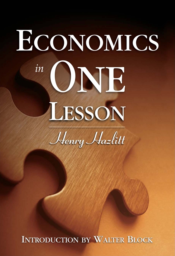

The case is different, however, when the State steps in and either buys the farmers' crops itself or lends them the money to hold the crops off the market. This is sometimes done in the name of maintaining what is plausibly called an "ever-normal granary." But the history of prices and annual carryovers of crops shows that this function, as we have seen, is already being well performed by the privately organized free markets. When the government steps in, the "ever-normal granary" becomes in fact an ever-political granary. The farmer is encouraged, with the taxpayers' money, to withhold his crops excessively. Because they wish to make sure of retaining the farmer's vote, the politicians who initiate the policy, or the bureaucrats who carry it out, always place the so-called "fair" price for the farmer's product above the price that supply and demand conditions at the time justify. This leads to a falling off in buyers. The "ever-normal granary" therefore tends to become an ever-abnormal granary. Excessive stocks are held off the market. The effect of this is to secure a higher price temporarily than would otherwise exist, but to do so only by bringing about later on a much lower price than would otherwise have existed. For the artificial shortage built up this year by withholding part of a crop from the market means an artificial surplus the next year. It would carry us too far afield to describe in detail what actually happened when this program was applied, for example, to American cotton. We piled up an entire year's crop in storage. We destroyed the foreign market for our cotton. We stimulated enormously the growth of cotton in other countries. Though these results had been predicted by opponents of the restriction and loan policy, when they actually happened the bureaucrats responsible for the result merely replied that they would have happened anyway. For the loan policy is usually accompanied by, or inevitably leads to, a policy of restricting production -- i.e., a policy of scarcity. In nearly every effort to "stabilize" the price of a commodity, the interests of the producers have been put first. The real object is an immediate boost of prices. To make this possible, a proportional restriction of output is usually placed on each producer subject to the control. This has several immediately bad effects. Assuming that the control can be imposed on an international scale, it means that total world production is cut. The world's consumers are able to enjoy less of that product than they would have enjoyed without restriction. The world is just that much poorer. Because consumers are forced to pay higher prices than otherwise for that product, they have just that much less to spend on other products.🏁
Global Leaderboard
| # | Player | Time | Duration | Accuracy | WPM | pp | |
|---|---|---|---|---|---|---|---|
| 1 | |||||||
| 2 | |||||||
| 3 | |||||||
| 4 | |||||||
| 5 | |||||||
| 6 | |||||||
| 7 | |||||||
| 8 | |||||||
| 9 | |||||||
| 10 |


The case is different, however, when the State steps in and either buys the farmers' crops itself or lends them the money to hold the crops off the market. This is sometimes done in the name of maintaining what is plausibly called an "ever-normal granary." But the history of prices and annual carryovers of crops shows that this function, as we have seen, is already being well performed by the privately organized free markets. When the government steps in, the "ever-normal granary" becomes in fact an ever-political granary. The farmer is encouraged, with the taxpayers' money, to withhold his crops excessively. Because they wish to make sure of retaining the farmer's vote, the politicians who initiate the policy, or the bureaucrats who carry it out, always place the so-called "fair" price for the farmer's product above the price that supply and demand conditions at the time justify. This leads to a falling off in buyers. The "ever-normal granary" therefore tends to become an ever-abnormal granary. Excessive stocks are held off the market. The effect of this is to secure a higher price temporarily than would otherwise exist, but to do so only by bringing about later on a much lower price than would otherwise have existed. For the artificial shortage built up this year by withholding part of a crop from the market means an artificial surplus the next year. It would carry us too far afield to describe in detail what actually happened when this program was applied, for example, to American cotton. We piled up an entire year's crop in storage. We destroyed the foreign market for our cotton. We stimulated enormously the growth of cotton in other countries. Though these results had been predicted by opponents of the restriction and loan policy, when they actually happened the bureaucrats responsible for the result merely replied that they would have happened anyway. For the loan policy is usually accompanied by, or inevitably leads to, a policy of restricting production -- i.e., a policy of scarcity. In nearly every effort to "stabilize" the price of a commodity, the interests of the producers have been put first. The real object is an immediate boost of prices. To make this possible, a proportional restriction of output is usually placed on each producer subject to the control. This has several immediately bad effects. Assuming that the control can be imposed on an international scale, it means that total world production is cut. The world's consumers are able to enjoy less of that product than they would have enjoyed without restriction. The world is just that much poorer. Because consumers are forced to pay higher prices than otherwise for that product, they have just that much less to spend on other products.🏁